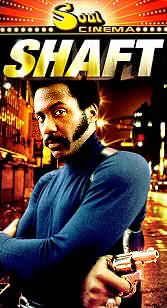Gordon Parks: 1912-2006
 It was kind of an off year for the Oscar's annual montage of the dead, but we already landed one big member of next year's fraternity: Gordon Parks died on Tuesday at the age of 93. I'm not going to talk about his importance or his photography or his great career, because I'm not much of a historian (here's the AP's obit). I'm just going to tell you about a movie Parks made, the coolest movie of all time, really. The movie is called Shaft.
It was kind of an off year for the Oscar's annual montage of the dead, but we already landed one big member of next year's fraternity: Gordon Parks died on Tuesday at the age of 93. I'm not going to talk about his importance or his photography or his great career, because I'm not much of a historian (here's the AP's obit). I'm just going to tell you about a movie Parks made, the coolest movie of all time, really. The movie is called Shaft.I remember the first time I saw Shaft. I remember where I was (a dorm room in Boston), I remember who I was with (my two roommates and a friend from the dorm next door). I remember how excited I was when I realized that everyone in the movie was going to call him Shaft. I remember how I felt when I first heard Isaac Hayes' immortal theme song (something along the lines of "HOLY SHIT!").
Shaft caught me at an important age. I was 16, and just becoming aware of the depth and beauty of movies that were older than I was. A steady diet of Welles, Ford, Fellini, Truffaut in that period had pounded into my head that old movies were important. Watching Shaft taught me old movies could be fun.
 I have read the original Ernest Tidyman Shaft novel. It's good, but Parks' movie is better. It's simpler, more pure: Shaft is simply and utterly the biggest badass ever to swagger through Times Square, on or off the silver screen. He is the be all, end all of cinematic cool: smart, suave, sexy, and sophistocated (and let's not forget that it's Richard Roundtree in the role) . I've seen the film maybe half a dozen times now, and it never gets old. The plot is perfect: private dick (can't resist) John Shaft caught in the middle of a turf war between the African-Americans and the Italians while the cops are right on his ass.
I have read the original Ernest Tidyman Shaft novel. It's good, but Parks' movie is better. It's simpler, more pure: Shaft is simply and utterly the biggest badass ever to swagger through Times Square, on or off the silver screen. He is the be all, end all of cinematic cool: smart, suave, sexy, and sophistocated (and let's not forget that it's Richard Roundtree in the role) . I've seen the film maybe half a dozen times now, and it never gets old. The plot is perfect: private dick (can't resist) John Shaft caught in the middle of a turf war between the African-Americans and the Italians while the cops are right on his ass.I have a favorite scene. The Mafia has sent some goons to beat Shaft up. They're waiting for him in the bar across the street from his pad. But they don't know what he looks like so he goes into the bar, and pretends to be the bartender. He serves them free drinks and gets them good and liquored up. Then he makes sure they're there for him and, when they're good and boozy, beats the ever loving crap out of them and gets them hauled off to jail.
Now that's cool.
I wrote a paper on Shaft in grad school; the assignment was to pick a film from our master list of hundreds of films we were supposed to see before graduation, and to study one scene in relation to one aspect of film form. Because I loved the movie and because I thought it would be a lot more fun than just about anything else on the list, I chose Shaft and studied the use of sound and mise-en-scene in the film's opening scene, where Shaft rises from a subway and walks through Times Square on his way to work.
Close examination revealed just how carefully Parks orchestrated the scene for maximum impact. Shaft is surrounded on his walk through Times Square by movie marquees, but Parks only shows the ones that comment on his film, like the one that reads "NEW POLICY" and "ALL COLOR" and suggest the film's importance as the first of what would be known as "blaxploitation" films.
On the Shaft DVD extras we get to watch Parks tell Hayes how to score the scene:
"“The sequence we saw this morning...Times Square, pan on off the skyscrapers, along the 42nd Street, over the marquees, and when Shaft pops up out of that subway, that’s when it should really come on, and carry him all the way through Times Square right to his first encounter with the newspaper man. That should be a driving, savage beat... so that we’re right with him all the time.”
Hayes made the music to fit the scene, and that lent the scene another powerful effect: by watching Roundtree walk, and designing a beat to match his steps, Shaft almost always appears to be walking in time to the music, while everyone around him (who, I should add, are mostly white) is not. The way his strut is timed to the music we're hearing gives the character an immediate sense of power and importance, even when he's a tiny speck on a crowded Manhattan street corner yet to speak a line of dialogue. (The full version of this brief but effective paper is available here)
It doesn't get any better than that Gordon. Thanks.

0 Comments:
Post a Comment
<< Home